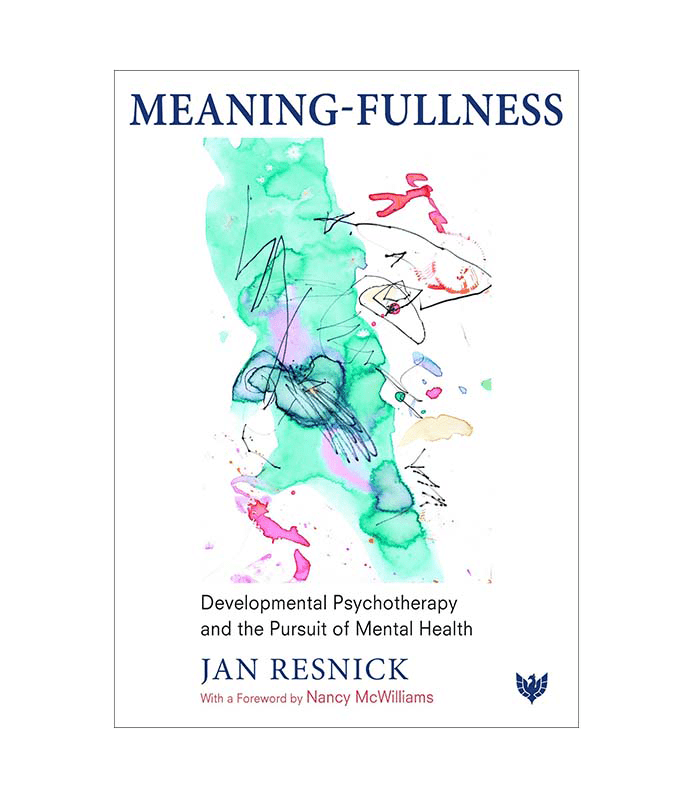The purpose of Meaning-Fullness: Developmental Psychotherapy and the Pursuit of Mental Health is to show why current mental health practices are falling short in the ever-growing need for effective responses to the epidemic of mental unwellness. Jan Resnick begins by taking a critical look at psychiatry and psychology, especially the misuse and corruption of research that undergirds these practices. He goes on to offer an alternative perspective, understanding, and approach to issues of mental disorders. Resnick focuses upon the existential vacuum, a term originating in Viktor Frankl’s classic text Man’s Search for Meaning, which refers to feelings of emptiness, purposelessness, and meaninglessness. Feelings that are increasingly prevalent in our contemporary world. The existential vacuum points to a domain of experience not well described by the DSM or treated with a bio-medical approach.
A radically different therapeutic approach emerges through elaborating Winnicott’s ideas in Playing and Reality, his last published work. Resnick shows how the capacity for meaning-making originates in early childhood development, and how this understanding can be applied to adult experience, thereby making psychotherapy a developmental process. Developmental psychotherapy aims to cultivate a greater capacity for play, creativity, relationship, and meaningful living. In addition, therapy must work toward relief of mental suffering, recovery from trauma, and mitigation, if not resolution, of psychological disorders. The theory is richly supported with clinical examples throughout the book, culminating in a long case study that integrates the ideas with clinical practice, which forms the final part of the book.
Dr Jan Resnick has created a must-read work for mental health practitioners the world over. His easy-to-read prose makes it accessible and of value to anyone concerned with issues of mental health and well-being, personal development and creating a meaning-full way of living.




 Jan Resnick has practised as a psychoanalytic psychotherapist for over 45 years. He trained in London where he was supervised by R. D. Laing, John Heaton, and Christopher Bollas. He moved from Europe to Australia in 1990 where he founded The Churchill Clinic that ran accredited professional trainings in Analytic Psychotherapy & Counselling. The founding president of the Psychotherapists & Counsellors Association of Western Australia, Jan received an Outstanding Achievement award for his contribution to the profession. He was an Editorial Advisory Board member of the national journal Psychotherapy in Australia, where he penned a regular column for over twenty years. An Advisory Board member of Blue Knot Foundation (formerly Adult Survivors of Child Abuse), Jan is also an accredited supervisor for the Royal Australian/New Zealand College of Psychiatrists in psychotherapy and supervises Developmental Paediatricians at the State Child Development Centre (West Perth).
Jan Resnick has practised as a psychoanalytic psychotherapist for over 45 years. He trained in London where he was supervised by R. D. Laing, John Heaton, and Christopher Bollas. He moved from Europe to Australia in 1990 where he founded The Churchill Clinic that ran accredited professional trainings in Analytic Psychotherapy & Counselling. The founding president of the Psychotherapists & Counsellors Association of Western Australia, Jan received an Outstanding Achievement award for his contribution to the profession. He was an Editorial Advisory Board member of the national journal Psychotherapy in Australia, where he penned a regular column for over twenty years. An Advisory Board member of Blue Knot Foundation (formerly Adult Survivors of Child Abuse), Jan is also an accredited supervisor for the Royal Australian/New Zealand College of Psychiatrists in psychotherapy and supervises Developmental Paediatricians at the State Child Development Centre (West Perth).
Christopher Bollas, author of ‘The Shadow of the Object’ –
‘This passionate book – written in an insistent first-person voice – is an inspiring call to arms for those in the mental health professions to discard quick-fix solutions to the challenges of being human. We must delve into time to understand how we are profound reservoirs of meaning. To quickly fix that – to remedy our dilemmas – is to engage in a fix. This work argues for and indicates how all of us can find meaning in our pain and our failures if we have the patience to do so. This book is a brilliant act of liberation on the author’s part – as it liberates the reader from overly worn prose and intellection – and becomes a beacon for all of us in our times.’
Farhad Dalal, psychotherapist and group analyst, author of CBT: The Cognitive Behavioural Tsunami: Manage-rialism, Politics, and the Corruptions of Science –
‘This book is a much-needed antidote for the troubled times that psychotherapy finds itself in. Jan Resnick draws on John Heaton, R. D. Laing, D. W. Winnicott, and a host of others to argue (convincingly and cogently) that the blight that humanity suffers from is not that of mental illness, but meaninglessness. Resnick deftly pulls together theory, discussion, and case study, and shows us that, ultimately, it is the heart that is central to the project of psychotherapy.’
Nancy McWilliams, from the Foreword –
‘… you will learn a lot from this book and, even better, you can expect to enjoy reading it. Written without jargon, self-inflation, or pretension, it explores – in accessible and even entertaining language – ideas that often come across as dense and complicated. Clinical vignettes, offered candidly and with the author’s description of his own emotional involvement in the patient’s story as it unfolds in each session, illuminate the developmental concepts that have inspired the book.’
Professor Brett Kahr, Senior Fellow, Tavistock Institute of Medical Psychology, London, and Honorary Director of Research, Freud Museum London –
‘Open-minded, independent thinkers will certainly embrace Dr Jan Resnick’s nearly half-century of clinical wisdom. Drawing upon such thinkers as Donald Winnicott, Ronald Laing, and Viktor Frankl, the author provides us with a critique of contemporary mental health as well as a very inspiring plan to improve our profession and our minds in the future.’
Deborah A. Luepnitz, PhD, author, ‘Schopenhauer’s Porcupines: 5 Stories of Psychotherapy’ –
‘Dr Resnik does well to criticise the false economy of short treatments that are increasingly popular. He describes a model of relational therapy that highlights childhood experience, dream work, transference, and the therapist’s reverie. One can imagine that if Donald Winnicott were alive today, he would be practising in this way. The clinical illustrations will be especially useful in teaching.’
Jonathan Shedler, Clinical Professor, University of California San Francisco, and author of ‘The Efficacy of Psychodynamic Psychotherapy’ –
‘At a time when so many experience life as hurried and empty (“There is a feeling of running a race but not knowing why or where the finish line is”) – and therapy too is increasingly hurried, rote, and occupied with superficial metrics and “efficiency” – Dr Resnick reminds us what meaningful psychotherapy is about. In lucid, unpretentious prose, he walks us into and through the questions at the heart of real psychotherapy: What makes life meaningful? Why does it so often feel meaningless for so many? How can that change? Dr Resnick has written a book for our time that will speak to beginning clinicians and experts both.’